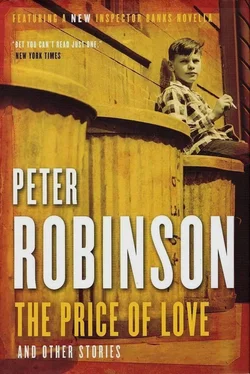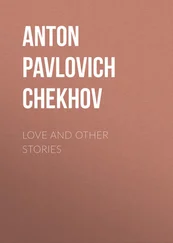The car continued on as Bayswater Road became Notting Hill Gate, then Holland Park Avenue. Finally, it turned down a broad, tree-lined street of elegant Victorian houses, and into a narrow mews, where the old coach houses and stables had been converted into small homes, most of them with whitewashed exteriors livened up by the occasional splash of bright color on a door, a garage or window frames. Some of the houses had hanging baskets or window boxes of red, yellow, purple and pink flowers.
The car came to a halt and Banks got out. The uniformed officer on guard opened the door and a familiar figure beckoned Banks inside. It was Superintendent Hatchard, pipe firmly clamped between his teeth, but not lit. When Banks’s eyes had adjusted to the dim light in the neat, tiny living room, he saw there was someone else present.
“I’d like you to meet someone, Alan,” Hatchard said, after removing his pipe. “This is Detective Superintendent Burgess. He’s Special Branch. Or something like that.” It was clear to Banks that Hatchard didn’t approve of whatever Burgess stood for, but that his hands were tied in the matter: he was only obeying orders. As for Burgess, he didn’t seem overly concerned with such delicacies. He wore a leather jacket over his open-neck checked shirt, despite the heat, blue denim jeans and white trainers. He was about six feet tall, in good shape, handsome, in a macho sort of way, with a strong jaw, slightly crooked teeth and cynical gray eyes. He can’t have been much older than Banks, but his hair was touched with gray at the temples.
“Banksy, pleased to meet you,” he said, as if they were old friends, sticking out his hand.
Banks shook. He was sure he had seen Burgess before and was trying to place him when the man himself did it for him. “About two or three years ago. Recent Falklands veteran, bit of a war hero, got himself into a scrape at a nightclub.”
“Beat up one of the girls and stabbed a doorman, you mean?”
“That’s the one. Can’t have our heroes looking like villains in the national press, can we? Especially when they’re shell-shocked.”
“So you’re the one they send around when they need a cover-up?”
Burgess laughed. “Very good. Very astute of you.” He put his hand on Banks’s elbow. “Come with me. I’ve got something to show you. Soon as that’s done we’ll get the team in and head down the road for a nice drink, just you and me.”
Curious, Banks followed him up the stairs, along a corridor and through the door into the bathroom. It was just about big enough to hold the two of them.
It was obvious to Banks the moment he crossed the threshold that something was terribly wrong. The blood spatter on the cream tiles certainly wasn’t part of the decor, and there was a cloying smell, as if something sweet had been marinating for too long. Before Banks even saw the corpse in the bathtub, he knew what he was in for.
Burgess just stood there as Banks took in the scene: the balding man with silvery wisps of hair around his ears, a deep gash visible in the wrist that rested on the side of the bathtub, the murky red-brown water up to his neck, the empty bottle of pills beside the almost empty bottle of whiskey on the floor.
“The doc’s been, confirmed death, and the photographer’s finished. We’re still waiting on the SOCOs, so don’t touch anything. His cleaning lady found him like this two hours ago.”
“Who is he?” Banks asked.
“The Right Honorable Norman Stafford, MP,” said Burgess. “This man’s a member of HM Government, Banksy. Was. Not one of the high-profile crowd, the ones you see on the telly, but a backroom boy. A hard worker, tireless supporter of his constituents, aggressive committee man, nonetheless. Nobody’s heard of him, nobody would recognize him in the street, but they also serve...”
“Suicide?”
“Oh, yes, I would say so, wouldn’t you?”
Banks shrugged. “These things can be arranged.”
“Cynic. Follow me. There’s more. Had enough? Ready to move on?”
“I’m ready,” said Banks. He followed Burgess back into the corridor and they crossed over to the master bedroom.
“He wasn’t married, Mr. Stafford,” said Burgess. “Not anymore. Married to his job, you might say. This is where he slept.”
Banks gazed around the room. There were framed prints and photographs everywhere, each and every one of them showing the pure, the innocent and the virginal. Joan of Arc. The Virgin Mary. Saint Bernadette of Lourdes. Saint Margaret of Antioch. There were actresses playing parts — the young Nastasia Kinsky in Tess and Brooke Shields in Pretty Baby — and countless unrecognizable photos of young innocent girls clipped from magazines and newspapers, their pure, trusting eyes burning into him, making him squirm.
On the bedspread lay a handwritten sheet of paper.
“Read it, Banksy,” said Burgess. “Read but don’t touch.”
Banks read. “‘To Whom It May Concern, I, Norman Archibald Stafford, wish to confess to the murders of two young girls in Soho. So there may be no mistake and no doubt as to the sincerity of this confession, I will outline in exact detail what I did and how I did it.’” And he did. The ritual washing, the shaving of the second victim, the Sellotape, the posing. All the elements that only the killer could know. The only thing he didn’t explain was why. The closest he got was the mention of the first time he felt the strong urge to kill to preserve the innocence of a young woman. He had no Sellotape, he wrote, and imagined there would be none in the small room, so he hatched the plan to equip himself and come back later. Somehow or other, the same girl knew to avoid him, so he chose someone else. Banks realized that the girl was Jackie Simmons, and that Stafford’s next choice was Pamela Morrison.
So it was over. No need to push the frightened dancer any further or make Jackie Simmons go over her story again. Or was it?
“I’d say he had a bit of an obsession, wouldn’t you, Banksy?”
“Seems that way.”
“Word has it that he was married once. They had a beautiful daughter. Age-old story. She fell in with a bad lot. Drugs. Sex. Crime. Ended up a prostitute in Glasgow and died of a drug overdose. It doesn’t explain it all, but it gives you a context, I think.”
“He wanted to re-create innocence, virginity in his victims.”
“Even after he’d had sex with them,” added Burgess. “I’ve read the case file. Aren’t people just endlessly fascinating? And mostly unknowable? Anyway, none of that really matters,” he went on as they walked back downstairs. “Bit of an anticlimax, really, isn’t it?”
Hatchard was still waiting in the living room, staring into space, having obviously seen it all before Banks had. “Well?” he said.
Burgess put his arm around Banks’s shoulders. “Let’s me and DI Banks here go for a nice drink, get the taste of death out of our mouths and see if we can work out a satisfactory solution to this little mess. Bernard, I take it you know what to do now?”
“I know.” Hatchard gave Banks a sheepish look, stuck his pipe back in his mouth and slunk out of the door.
Burgess hammered on the locked door of the pub on the corner.
“I told you, they’re closed,” said Banks. “Won’t be open for another hour or more.”
Burgess ignored him and kept on knocking. Eventually, a young man appeared behind the glass, scowled and pointed at his watch. Burgess thrust his warrant card in his face. The door opened.
“Important police business, sonny,” Burgess said. He pointed to a corner that couldn’t be seen from the street. “We’ll sit over there. And I’ll have a pint of lager. Banksy?”
“Bitter, please.”
Читать дальше












